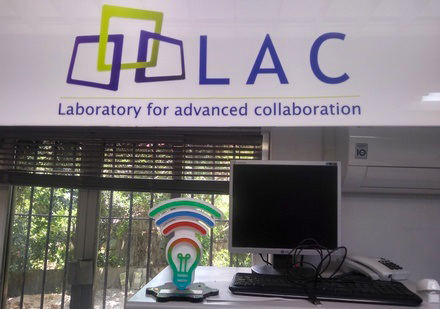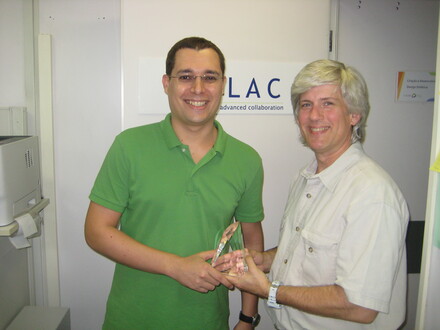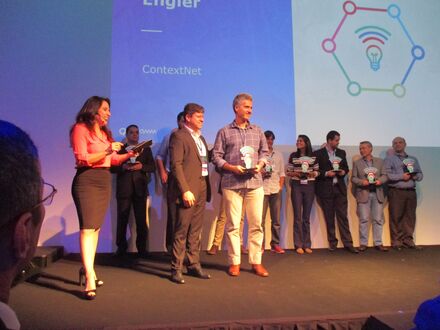
Photo credit: Personal archive
Led by Markus Endler, DI’s director, the laboratory focuses on mobile computing, pervasive computing, and IoT
One of the great features of the Department of Informatics (Computer Science Department, a.k.a. DI) is the existence of 13 Technological Innovation Centers (TICs), the research laboratories coordinated by professors and researchers of the DI. These laboratories carry out applied research and innovation in many areas, such as Data Science, Software Engineering, AI and Machine Learning, Optimization of graph algorithms, Games and Virtual Reality, and the Internet of Things.
One of these labs is the Laboratory for Advanced Collaboration (LAC), founded in 2002 by the current director of the DI, Markus Endler.
LAC is responsible for conducting basic and applied research in distributed computing with mobility, interconnected pervasive computing, and since 2014, also in Internet of Things with mobility (Internet of Mobile Things – IoMT).
Since its foundation, it has been dedicated to the development of middleware platforms. i.e. a software infrastructure involving services and protocols, which facilitate the development, operation, and management of adaptive distributed applications.
In parallel, LAC has also developed numerous innovative applications (prototypes) to test and validate the functionality of the underlying middleware. All of this software has been and continues to be used extensively for postgraduate research and teaching.
Over the past 10 years, LAC has innovated in the creation of an extensible middleware platform for IoMT applications. This middleware, called ContextNet, has components in the cloud and on mobile devices (e.g. on smartphones or other mobile devices, such as drones), and assumes the premise that some elements of the infrastructure can also run on mobile nodes, thus allowing monitoring and controlling IoT devices in motion, and even identifying and classifying patterns of object mobility, such as co-mobility of people or things.
ContextNet is used in several research groups at PUC-Rio and also at other universities. In 2020, for example, LAC began research on Pervasive Computing and IoT in partnership with the University of Waterloo, Canada, in order to create an IoT system of hospital and outpatient health services, based on the ContextNet middleware.
“This is a very complex and extensible middleware, which serves as a very useful and versatile tool for the development of sophisticated applications for the Internet of Things and which takes into account the mobility of agents and things, and their changing contexts”, explained Endler.
Partnerships with universities, research centers, and companies

Former DI student and then LAC researcher, Gustavo Baptista, receiving the Software Development Award from Boeing systems engineer Tom Dubois in 2012. Photo credit: Personal file
The University of Waterloo is not the only partnership example. Over the years, LAC has done projects with several international partners, such as Boeing, Microsoft Research, FairCom, Microsoft Brazil, Bell Helicopter, Sikorsky, and Petrobras / Liquigás.
It is also worth highlighting partnerships with national and international academic groups, such as the University of São Paulo (USP), the Federal University of Minas Gerais (UFMG), the Federal University of Maranhão (UFMA), the German research center L3S, the Technical University Dresden and the University of Stuttgart, Germany.
In addition, LAC is a participant and member of the Board of the National Institute of Science and Technology (INCT), which includes 14 Brazilian universities and startups, with more than 40 researchers and entrepreneurs.
Achievements and awards
Recently, the relevance of ContextNet middleware has been duly recognized. In November 2017, Endler received the 2017 Impact Technologies Award, granted by Qualcomm Brasil, for the development of ContextNet.
The Impact Technologies Award, which had about 100 competitors, was also given to nine other startups and freelance inventors, with the aim of recognizing technological innovation initiatives and rewarding their respective inventors. In this case, the LAC middleware was the only entirely academic project to win the award, and the only one in the middleware infrastructure category, which is agnostic to a specific problem or application.

The founder of LAC and current director of DI, Markus Endler, receiving the Innovation Technologies award in 2017. Photo: Personal archive
“Receiving the award was a great honor, as ContextNet was recognized as being a work of RD&I that has brought innovation to the country, in the form of a tool that facilitates the development of distributed IoT applications”, said Endler.
Bridge to the job market
Currently, LAC has the collaboration of postdocs, doctoral students, master’s students, interns, and undergraduate students, each working on a total of 13 middleware evolution sub-projects. At LAC, several researchers and external collaborators also work, among them, including other DI professors, such as Edward Hermann Haeussler, Anderson da Silva, Valeria de Paiva, and Adriano Branco.
According to the doctoral student Vitor Pinheiro, the work at LAC helped him to have contact with real problems in the area, due to the incentive for contact with companies. “By having contact with the problems still within the university, I was able to develop my critical capacity to assess which solution is most suitable for each problem”, he said.
Also according to Pinheiro, LAC and the other laboratories at PUC-Rio helped him to make a connection between the academy and the job market.
“The laboratories serve as a mediator between companies and students, almost as a matchmaker, in which both sides win. Students win because they have the opportunity to have contact with real problems and with companies already participating in the creation of solutions. Companies, on the other hand, win because they can evaluate the student from this process and can hire a professional that they already have greater confidence that will add value.”
The LAC is always open to receive interns, undergraduate, and graduate students, as well as post-doctoral students, who are willing to “wear the shirt” and become “LACians”. To learn more about LAC research, visit www.lac.inf.puc-rio.br and / or contact Markus Endler by e-mail: endler@inf.puc-rio.br.
Led by Markus Endler, DI’s director, the laboratory focuses on mobile computing, pervasive computing, and IoT One of the great […]

